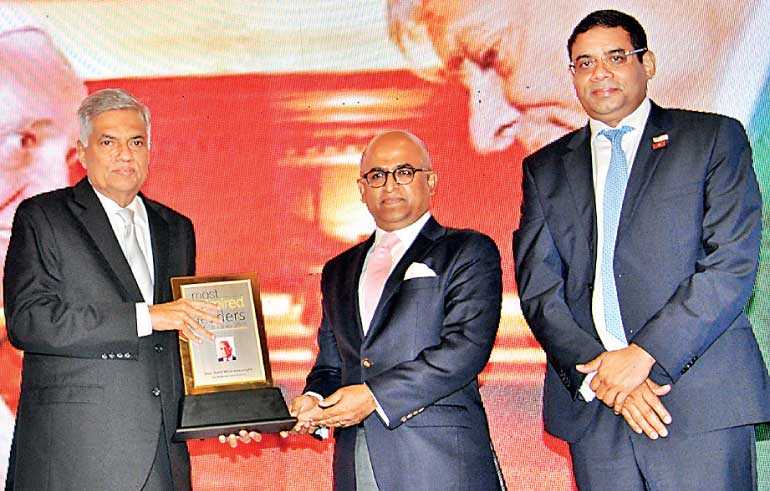Thursday Feb 26, 2026
Thursday Feb 26, 2026
Monday, 10 September 2018 01:48 - - {{hitsCtrl.values.hits}}

Prime Minister Ranil Wickremesinghe receives the Most Admired Leader of Sri Lanka 2018 – National Contribution Award presented by ICC India President Jawahar Vadivelu last night. ICCSL Chairman Dinesh Weerakkody is also present - Pic by Ruwan Walpola
By Uditha Jayasinghe
Transforming Sri Lanka’s economy from a non-tradable focus to create more tradable goods is the basis of the economic restructuring targeted by the Government, Prime Minister Ranil Wickremesinghe said yesterday, calling on the private sector to become dynamic partners in the conversion.
Wickremesinghe was speaking at the ceremony to award the ‘Most Admired Companies of Sri Lanka’ at Shangri-La, Colombo. The awards were organised in partnership with the International Chamber of Commerce, Sri Lanka (ICCSL) and the Chartered Institute of Management Accountants (CIMA) Sri Lanka.
While congratulating the winners, Wickremesinghe pointed out that Sri Lanka’s economy was earlier driven by policies that promoted non-tradable sectors such as infrastructure development, resulting in tradable goods such as exports declining.
The resulting debt could only be managed by promoting investment and exports to push growth through greater integration with global value chains.
“It is certainly not the best of times as far as the global economy is concerned and it can become even more volatile in the future. Nevertheless, challenges have to be faced and what we are doing is restructuring our economy back to tradable goods. I would like to remind those present here that the merchandise exports of Sri Lanka as a percentage of GDP have declined from 33% in 2000 to 13% of GDP by 2017. That is the hard truth. Trade openness has also reduced from 77.4% to 37.14%,” he said.
Even when Sri Lanka enjoyed growth rates of 8% in the years after the war concluded they were fuelled by growth in the non-tradable sector, mainly construction driven by public infrastructure. Since then growth has been subdued, usually falling between 4% and 4.5%, and impacted by weather challenges, he pointed out.
“The investment activities that took place in the preceding period were not targeted to sectors that had the potential to sustain high economic growth, capacity expansion and productivity improvement. Exports only make up one-third of GDP growth. Foreign loans were largely channelled to infrastructure projects,” Wickremesinghe noted, adding that the Hambantota port, Mattala airport and the Norochcholai power plant created debt of Rs. 1.7 trillion. He said that about a quarter of the $ 12 billion debt Sri Lanka would have to pay over the next few years was comprised of foreign debt repayments.
“The widening trade and current account deficits and the increased reliance on foreign borrowings were the inevitable consequences of growth dependent on domestic demand. Although foreign borrowings have increased significantly in the past 10 years such borrowings have not been invested in supporting and promoting the tradable sector of the economy. As the tradable sector has not expanded this continues to contribute to higher debt servicing pressure. However, the expansion of the non-tradable sector has not yielded the envisaged growth. This is what we are up against and it is a big challenge.”
The Prime Minister acknowledged debt servicing remains a daunting task, especially given the appreciating dollar but outlined plans to give a boost to local companies by tinkering with tax policies that were introduced recently.
“Debt servicing means collecting higher revenues. Tax proposals that are now being implemented are not arbitrary. Certainly they are results of discussions with the IMF but we realised there were going to be problems and we said let the first year ago by and then make adjustments. Already we are in discussions with the private sector on what amendments have to be made and those have been fruitful discussions.”
Sri Lanka has to join the fourth industrial revolution taking place in other East Asian countries to become developed and escape hefty debt repayments. Wickremesinghe, borrowing a phrase from a previous speaker at the event who described successful companies as those being able to evolve to changing market lifecycles that have the lifespan of a fly while still having the staying power of a tortoise, as winners, quipped that he did not mind which animals local companies personified as long as they grew.
“A restructuring means refocusing on tradable goods and in this game there will be winners and losers. Inevitably the losers will complain and the winners will stay quite. We took on a challenge and we still have 2019 to get through and with good economic management we will do that. But it does mean that we need a private sector willing to take up this challenge. I won’t distinguish between the fly and the tortoise, as long as they are moving forward, that is all I want. We have to think of our future.”
A Trade Assistance Package, the draft of which has already been released to the public for feedback, would be part of government policy to assist companies to adapt as the economy continues to liberalise.
“We are also bringing out a new paper on trade adjustment and how to help Sri Lankan companies in the next five to 10 years as we adjust to a more global economy. This paper has been approved in principle by the Cabinet and has been put forward for discussion with the private sector. The Government can’t be an ostrich. We can’t hide our heads and shout slogans all the time, certainly not this Government. It is far better to realise that politics is the art of the possible and go ahead.”